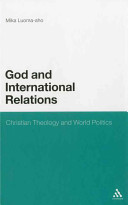 In this fresh and provocative study, Mika Luoma-aho is not content with merely contributing to skepticism concerning the secular narrative about the Westphalian order or with reconfiguring the dilemmas concerning the scientific versus political character of international relations. His program is far more ambitious. In fact he turns the recently developed discourse on religion and international relations upside down. This book goes beyond the simple acknowledgment of the relevance of religion for the discipline of international relations, and aims at unveiling the religious nature of international relations itself. The fundamental belief of this political religion is in the existence of nations, from which follows the typical modern doctrines concerning states and the relation among these imagined entities.
In this fresh and provocative study, Mika Luoma-aho is not content with merely contributing to skepticism concerning the secular narrative about the Westphalian order or with reconfiguring the dilemmas concerning the scientific versus political character of international relations. His program is far more ambitious. In fact he turns the recently developed discourse on religion and international relations upside down. This book goes beyond the simple acknowledgment of the relevance of religion for the discipline of international relations, and aims at unveiling the religious nature of international relations itself. The fundamental belief of this political religion is in the existence of nations, from which follows the typical modern doctrines concerning states and the relation among these imagined entities.
The program, Luoma-aho explains, is inspired by the well-known Schmittean dictum on the theological pedigree of the modern political vocabulary. Luoma-aho, very simply put, thinks through the consequences of this dictum as regards the nature of the phenomenon of international relations, often thought of as a hard science that relies on a universalistic concept of reason, especially on its modernist fashion, subsumed to a strong version of rational calculation. This paradigmatic shift implies that the philosophical driving forces of this study in political theory are essential. Even more important is the explicit theological impetus: the ‘book is […] an attempt to consider—or indeed reconsider—international politics with the premise that “the world” is not all there is to it: that there is a God whose existence is relevant to the life of individuals, their communities, and the conditions they accommodate.’
This deeply theologised rethinking of international relations is intellectually refreshing and exciting, and in a way is much more realistic than the mainstream program of social and political science backed by an alleged ‘methodological atheism’.
Peter Losonczi is a research associate at Centre for Metaphysics and Philosophy of Culture at Institute of Philosophy, KU Leuven. He is the EC Secretary of the International Research Network on Religion and Democracy. His research areas are politics and religion, political theology, philosophy of religion, history of philosophy.
Share This
Share this post with your friends!